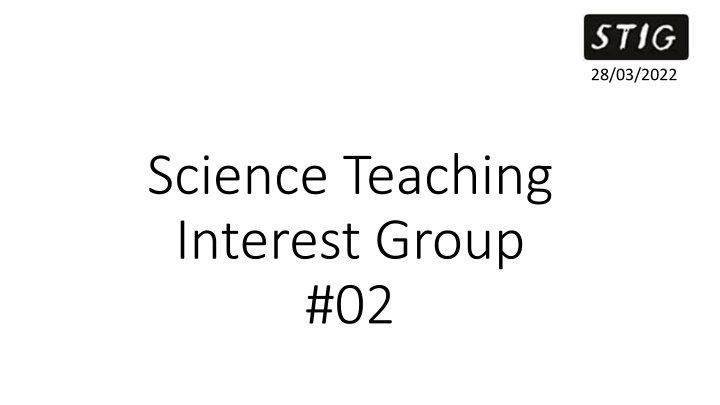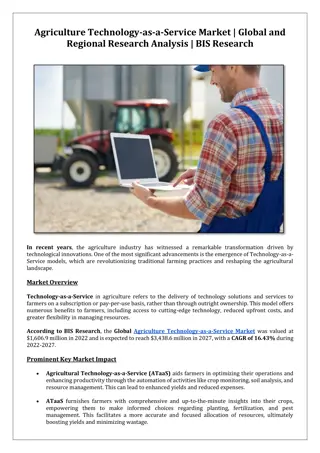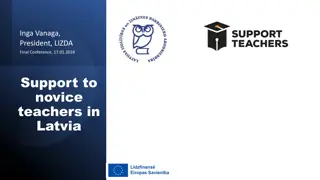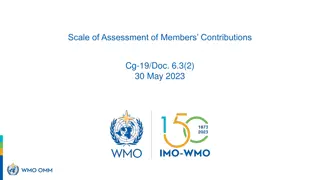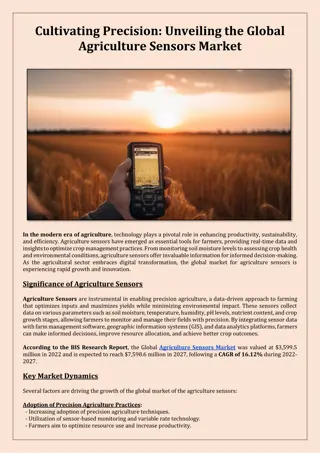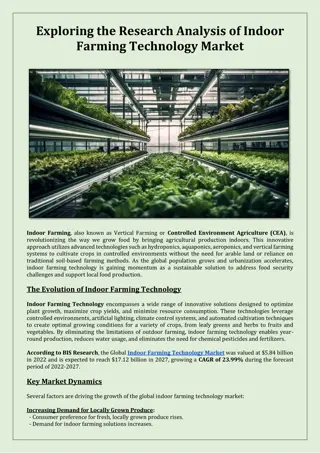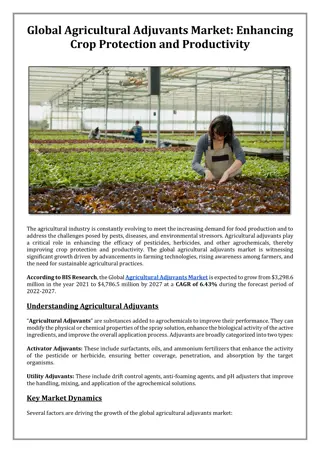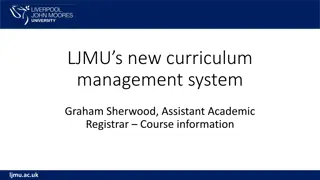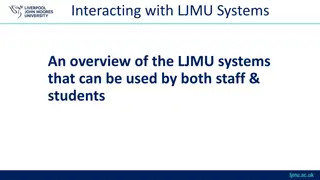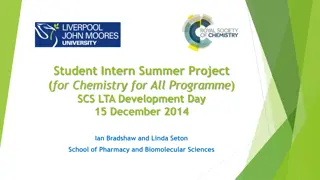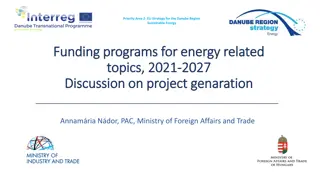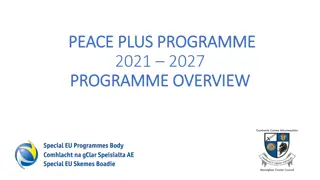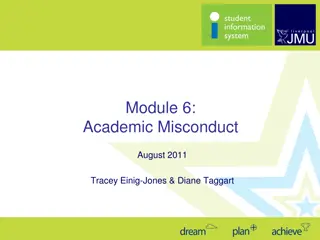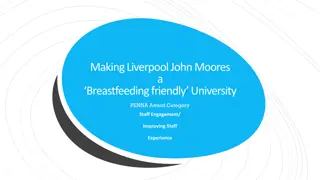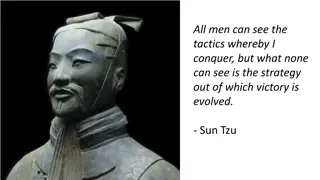LJMU Teaching & Learning Strategy 2022-2027 Overview
This overview covers the LJMU Science Teaching Interest Group meeting, the LJMU Teaching & Learning Strategy 2022-2027, key themes and strategic priorities, vision statement emphasizing student-centered approaches, and the LJMU Graduate profile focusing on essential skills and attributes. The strategy emphasizes inclusive curriculum, sustainable development, digital education, and wellbeing, with a focus on student development and academic excellence.
Download Presentation

Please find below an Image/Link to download the presentation.
The content on the website is provided AS IS for your information and personal use only. It may not be sold, licensed, or shared on other websites without obtaining consent from the author.If you encounter any issues during the download, it is possible that the publisher has removed the file from their server.
You are allowed to download the files provided on this website for personal or commercial use, subject to the condition that they are used lawfully. All files are the property of their respective owners.
The content on the website is provided AS IS for your information and personal use only. It may not be sold, licensed, or shared on other websites without obtaining consent from the author.
E N D
Presentation Transcript
28/03/2022 Science Teaching Interest Group #02
Brings together colleagues from within the Faculty to discuss matters of contemporary interest relating to teaching, learning and assessment. Sits outside our deliberative structures and so nothing is off the table. Feeds into decision-making by Faculty Education Committee and FMT. Brings together colleagues with an established interest in teaching who had no previous opportunity to gather: PGCert/CAP Observers Academic LJMU Teaching Award Winners NSS Champions National Teaching Fellows School LTA Coordinators
LJMU TEACHING & LEARNING STRATEGY 2022-2027 Version 1 developed by the Teaching & Learning Academy. It recognises: previous-strategy work is ongoing and remains highly relevant. external requirements of organisations such as the Office for Students and Ofsted. there is no requirement to explicitly reference initiatives such as the Teaching Excellence Framework or Access and Participation Plans: these will inform performance indicators rather than strategic intentions.
LJMU TEACHING & LEARNING STRATEGY 2022-2027 There are four themes that encapsulate the most significant developments from the predecessor of this strategy. These are: Inclusive curriculum Education for Sustainable development Digital education Education for wellbeing The strategic priorities outlined in the strategy focus on these themes. Version 2 will be released in April for further review.
VISION The university puts students at the very heart of its endeavours and recognises the importance of partnership and collaboration for the development of the absolute best approaches to teaching, learning and assessment. It will be noted for exceptional academic practice that motivates and inspires staff, students, and graduates to make a positive contribution locally, nationally or globally.
THE LJMU GRADUATE THE LJMU GRADUATE At the end of their programme of study and wider university experience, the graduate should: Have knowledge and critical insight in their chosen field that is appropriate to their level of study with an understanding of how environmental, economic, social, and political systems interconnect Be information literate Take an analytical and creative approach to problem solving Value cultural diversity and be responsible global citizens by recognising how the people and countries of the world are inter-connected and inter-dependent Be digitally capable and responsible Be inquisitive with a thirst for knowledge Appreciate the importance of ethical decision-making, with the skills and understanding to make decisions based upon environmental and social sustainability Communicate effectively, whether orally or in writing Be confident, resilient, and ambitious with the skills and outlook to adapt in a rapidly changing world Be able to work collaboratively, as well as independently Recognise the value of lifelong learning
ENABLING FACTORS The LJMU Learning and Teaching Strategy identifies and details six enabling factors that, working together in a coordinated and student- centred manner, will nurture the development of the LJMU graduate. People Teaching & assessment Curriculum Policy, process & regulation Physical & digital estate Institutional culture
PEOPLE: STRATEGIC PRIORITIES 1. LJMU will actively seek to recruit students and staff from diverse educational, cultural, and social backgrounds. 2. In line with LJMU s commitment to The UN Sustainable Development goals, LJMU will support staff and students to contribute to the wellbeing of people, places, and the planet 3. The Institution will work to increase both student and staff awareness of equality and diversity, discrimination and unconscious bias, and encourage them to champion diversity proactively and with confidence. 4. The University will invest to enhance the digital skills and information literacy of staff and students.
CURRICULUM: STRATEGIC PRIORITIES 1. The University will support the efforts of staff and students, with appropriate input from relevant external stakeholders, to facilitate the co-production of curricula 2. LJMU recognises that knowledge is historically contingent and will work to ensure that contributions of individuals from diverse backgrounds are reflected in curricula. 3. The University will support the development of programmes that help students to make ethical decisions based on understanding, insight and analysis of information and evidence. 4. Education for Sustainable Development will be a feature of all LJMU taught courses, so an LJMU education addresses social, environment and economic concerns to champion sustainability needs 5. The institution will support well-managed induction and transition activities to facilitate students understanding of their responsibilities and the expectations on them, as well as their confidence and resilience as learners. 6. Curriculum planning will balance student workload and maximise flexibility and choice where appropriate.
TEACHING AND ASSESSMENT: STRATEGIC PRIORITIES 1. Programme teams will be expected to utilise a range of assessment methods that support the application of skills and understanding to future areas of study, as well as explicitly addressing relevant learning outcomes. 2. Academic and relevant support staff will help students to acquire the knowledge, skills and experiences valued by employers. 3. The University will actively encourage academic practices that allow students to experiment and learn from mistakes in a safe and non-detrimental environment. 4. Programme teams will use a range of teaching and assessment methods to support diverse student needs and enhance skills development. 5. The University will provide opportunities for students to collaborate with staff and their peers in scholarship and enquiry. 6. The University will actively capitalise on the potential of in-person and online delivery to maximise students engagement with their learning, as well as with their fellow students.
PHYSICAL & DIGITAL ESTATE: STRATEGIC PRIORITIES 1. The University will provide access to ethically managed learner data to allow students to reflect on their learning journeys, as well as enabling staff to provide targeted support and inform curriculum development. 2. Teams will adopt a consistent approach to the organisation and management of learning, whether on campus or through the virtual learning environment. 3. Environmental sustainability will be addressed in the planning and operation of curricula. 4. LJMU will support inclusive learning and teaching through the acquisition and development of accessible and assistive technologies. 5. Estate developments will support an institutional drive towards Active Blended Learning.
POLICY, PROCESS AND REGULATIONS: STRATEGIC PRIORITIES 1. Programme teams will communicate regularly with students in a clear and accessible manner. 2. University online or campus-based systems and processes will be designed to help students transition into and through the various stages of their university experience. 3. Student support will address the impact of poverty and disadvantage, including digital poverty, on students ability to progress and achieve the most from their university experience. 4. The University will provide accurate institutional data and learner analytics that are germane to student success but understood in the context of the holistic student experience. 5. Student related regulations will prioritise equitable access, success and progression.
INSTITUTIONAL CULTURE: STRATEGIC PRIORITIES 1. The institution recognises that equality, diversity, and inclusion (EDI) is fundamental to excellence in learning and teaching and will act to embed EDI into all student-facing services. 2. The University will facilitate work across disciplinary and organisational boundaries. 3. The University provides opportunities for students to engage with each other outside the formal, timetabled curriculum. 4. The University will offer co-curricular and extracurricular activities that inspire confidence in students, facilitate skill development and broaden their horizons. 5. All staff will take be encouraged to take an active role in nurturing students self-esteem and supporting their wellbeing.
INSTITUTIONAL CULTURE: STRATEGIC PRIORITIES 1. The institution recognises that equality, diversity, and inclusion (EDI) is fundamental to excellence in learning and teaching and will act to embed EDI into all student-facing services. 2. The University will facilitate work across disciplinary and organisational boundaries. 3. The University provides opportunities for students to engage with each other outside the formal, timetabled curriculum. 4. The University will offer co-curricular and extracurricular activities that inspire confidence in students, facilitate skill development and broaden their horizons. 5. All staff will take be encouraged to take an active role in nurturing students self-esteem and supporting their wellbeing.
OPERATIONAL FRAMEWORK Local Plans these plans will outline how strategic objectives will be achieved at faculty or professional service department level. It is envisaged that this will be updated on a rolling basis, as and when required. There will be no formal update cycle. Monitoring of progress will be overseen by Faculty Education Committees (or professional service equivalent) and reported annually to Education Committee/Student Experience Committee. Thematic priority workstreams these will address those areas of the strategy that signal the most significant development of LJMU academic practice. In addition to digital education (which is addressed above), these are inclusive curriculum, Education for Sustainable Development and education for wellbeing Digital transformation framework considering the emphasis on digital capacity, information literacy and active blended learning, there will be coordinated cross-institutional work associated with digital education, leadership, capacity building, wellbeing and infrastructure Student Engagement there is a strong emphasis on partnership working, collaboration and the student voice in this strategy. To ensure effective operation, it will sit alongside and be informed by an institutional Student Engagement Strategy (in development) Key Performance Indicators - to support monitoring activity, appropriate indicators and targets will be set. These may be at institutional level or locally derived as appropriate. Indicators will also be informed by the expectations of external agencies if necessary. These indicators will be reviewed periodically and revised as necessary. As a result, they are not published with the strategy.
LJMU TEACHING & LEARNING STRATEGY 2022-2027 People Teaching & assessment Curriculum Policy, process & regulation Physical & digital estate Institutional culture
